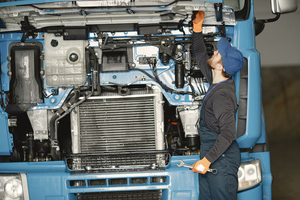Blog Information
- Posted By : Rhyz Cruz
- Posted On : Feb 24, 2025
- Views : 4
- Category : Cars
- Description : This article explores the different kinds of truck batteries available today, their characteristics, advantages, and disadvantages, as well as how they align with current industry trends.
Overview
Truck batteries are essential for the performance and efficiency of commercial vehicles. As the trucking industry undergoes rapid changes due to new technology and sustainability efforts, understanding the various types of truck batteries is increasingly important. This article explores the different kinds of truck batteries available today, their characteristics, advantages, and disadvantages, as well as how they align with current industry trends.
The Evolution of Truck Battery Technology
Historical Context
The truck battery technology journey has undergone many developments over the years. The most common one initially was the lead-acid battery, as it was inexpensive and reliable. The lead-acid battery dates back to the 19th century and has been developed upon several times with regards to design and efficiency. Still, in the wake of growing demands for longer-lasting and more efficient energy storage solutions, alternatives have emerged.
In recent years, the discovery and development of innovative technologies, particularly in the realms of materials science and engineering, have given the world lithium-ion batteries. A larger trend underway in the transport sector is shifting toward electrification, where efficiency and cleaner sources of energy come into play.
Current Trends in Battery Technology
Today, battery technology is marked by rapid innovation. The focus does not only target the improvement of performance metrics in terms of life and charging time but also features of safety as well as environment-friendliness. The rising popularity of electric vehicles has propelled this trend into an even greater pace, leading manufacturers to splurge on their research and development to meet these new standards for performance.
As battery technology continues to evolve, it is essential for stakeholders in the trucking industry—fleet operators, manufacturers, and policymakers—to stay informed about these developments to make strategic decisions regarding their energy solutions.
Types of Truck Batteries
Lead-Acid Batteries
Lead-acid batteries have been standard in trucking for years. Lead dioxide and sponge lead plates are submerged in a solution of sulfuric acid for the electrolyte.
Lead-acid batteries are cheap and robust energy storage solutions for vehicles, so they remain attractive despite being an older technology. As well established, they enjoy a huge comprehension and support benefit, accompanied by excellent recyclability.
However, their heavy weight can reduce vehicle payload capacity, and their shorter lifespan, typically 3-5 years, necessitates more frequent replacements. While newer battery technologies offer improvements in these areas, lead-acid batteries maintain a competitive edge in specific applications due to their affordability and reliability. For these reasons, they remain a relevant option in various industries.
Lithium-Ion Batteries
Lithium-ion batteries have emerged as a leading alternative to lead-acid batteries in recent years. They utilize lithium compounds as electrodes and offer several advantages that align with modern trucking needs.
Lithium-ion batteries provide higher energy density, a key advantage for electric trucks seeking lightweight components and improved efficiency. These batteries boast a lifespan up to five times longer than lead-acid options and offer faster charging, minimizing downtime for fleets.
Their weight efficiency further allows for increased payload capacity, a critical factor for commercial vehicles. However, the higher initial cost presents a significant barrier to entry, and their temperature sensitivity requires careful management to prevent performance degradation. Despite these challenges, the benefits of lithium-ion technology often outweigh the drawbacks, driving its increasing adoption in the electric vehicle market.
Comparative Analysis of Battery Types
Performance Metrics
When comparing truck battery types, several performance metrics come into play:
Lifespan and Durability Comparison
Lead-acid batteries typically last 3-5 years under normal conditions, while lithium-ion batteries can last 8-15 years depending on usage patterns. This longevity translates into fewer replacements and lower overall costs for fleet operators over time.
Charging Times and Efficiency
Lithium-ion batteries excel in charging efficiency; they can recharge up to 80% within an hour compared to lead-acid batteries that may take several hours for a full charge. This rapid turnaround is crucial for fleets that rely on quick turnaround times between trips.
Cost Considerations
Initial Investment vs. Long-Term Savings
While lead-acid batteries are cheaper upfront, their shorter lifespan often leads to higher long-term costs due to frequent replacements. In contrast, although lithium-ion options require a larger initial investment, their longevity and reduced maintenance needs can result in significant savings over time.
Maintenance Costs
Lead-acid batteries require regular maintenance (e.g., checking fluid levels), whereas lithium-ion options are generally maintenance-free. This difference can further contribute to cost savings associated with lithium-ion technology.
Industry Trends Influencing Battery Selection
Shift Toward Electric Vehicles (EVs)
The rise of electric vehicles is reshaping battery demand across the trucking industry. As companies seek ways to reduce emissions and fuel costs, electric trucks powered by advanced battery technologies are becoming more appealing.
Impact on Battery Demand
The transition toward EVs has spurred significant investment in battery research and development. Manufacturers are racing to create high-performance solutions that meet the specific needs of commercial trucking applications.
Case Studies
Several companies have successfully transitioned their fleets to electric models using lithium-ion technology. For instance, major logistics firms have reported substantial savings on fuel costs while enhancing their sustainability profiles through electrification initiatives.
Key Takeaway
Understanding the comparative analysis of different kinds of truck batteries is essential for stakeholders in the trucking industry as they navigate an evolving landscape marked by technological advancements and sustainability goals. While traditional lead-acid batteries remain prevalent due to their cost-effectiveness and established support networks, emerging technologies like lithium-ion offer compelling advantages that align with modern operational needs.
As electric vehicles become increasingly mainstream within commercial fleets, it is crucial for fleet operators to stay informed about advancements in battery technology. Ultimately, embracing innovation in truck battery technology will not only benefit individual companies but also support broader efforts toward a cleaner transportation future.
